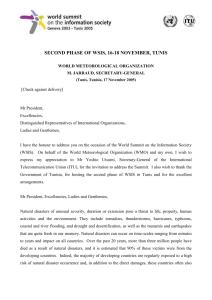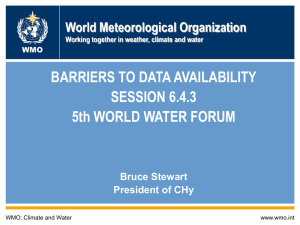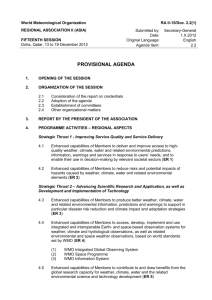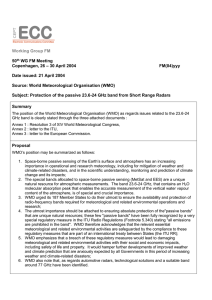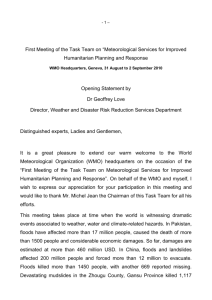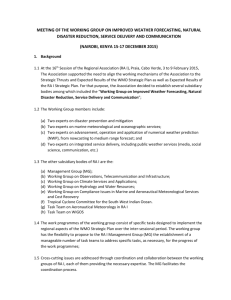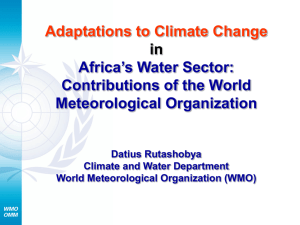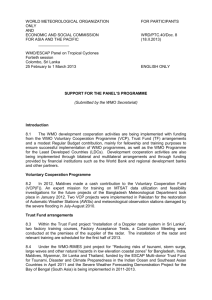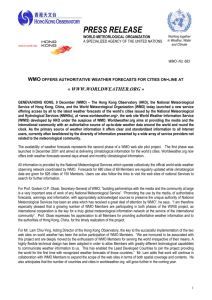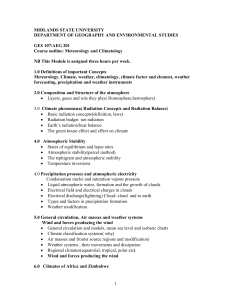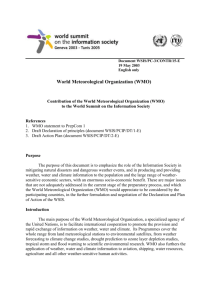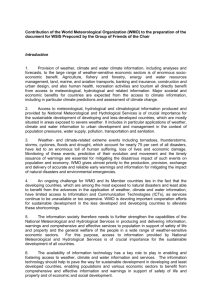Every year natural hazards cause significant loss of life, and
advertisement
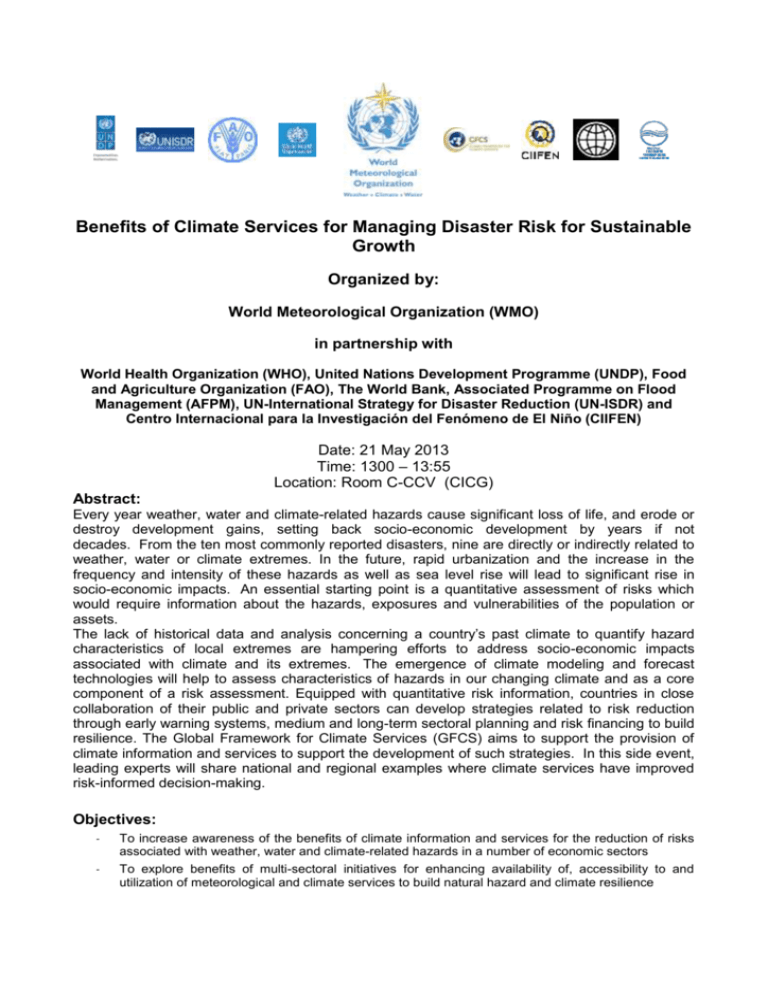
Benefits of Climate Services for Managing Disaster Risk for Sustainable Growth Organized by: World Meteorological Organization (WMO) in partnership with World Health Organization (WHO), United Nations Development Programme (UNDP), Food and Agriculture Organization (FAO), The World Bank, Associated Programme on Flood Management (AFPM), UN-International Strategy for Disaster Reduction (UN-ISDR) and Centro Internacional para la Investigación del Fenómeno de El Niño (CIIFEN) Date: 21 May 2013 Time: 1300 – 13:55 Location: Room C-CCV (CICG) Abstract: Every year weather, water and climate-related hazards cause significant loss of life, and erode or destroy development gains, setting back socio-economic development by years if not decades. From the ten most commonly reported disasters, nine are directly or indirectly related to weather, water or climate extremes. In the future, rapid urbanization and the increase in the frequency and intensity of these hazards as well as sea level rise will lead to significant rise in socio-economic impacts. An essential starting point is a quantitative assessment of risks which would require information about the hazards, exposures and vulnerabilities of the population or assets. The lack of historical data and analysis concerning a country’s past climate to quantify hazard characteristics of local extremes are hampering efforts to address socio-economic impacts associated with climate and its extremes. The emergence of climate modeling and forecast technologies will help to assess characteristics of hazards in our changing climate and as a core component of a risk assessment. Equipped with quantitative risk information, countries in close collaboration of their public and private sectors can develop strategies related to risk reduction through early warning systems, medium and long-term sectoral planning and risk financing to build resilience. The Global Framework for Climate Services (GFCS) aims to support the provision of climate information and services to support the development of such strategies. In this side event, leading experts will share national and regional examples where climate services have improved risk-informed decision-making. Objectives: - To increase awareness of the benefits of climate information and services for the reduction of risks associated with weather, water and climate-related hazards in a number of economic sectors To explore benefits of multi-sectoral initiatives for enhancing availability of, accessibility to and utilization of meteorological and climate services to build natural hazard and climate resilience - To highlight the benefits of strengthened coordination, collaboration and partnerships at international, regional, national and local levels for development and delivery of relevant climate services to support decision making for various sectoral applications Panel Format: The side event is for a total of 55 minutes. The side-event will be in discussion format. It will include 5 panelists. The panelists will make 5-minute statements highlighting key messages (unfortunately, there is no time to get into details). One slide or hand-out could be used in the background to support your key messages (No presentations please, there is no time!) Agenda and the list of panelists: Dr. Maryam Golnaraghi (WMO) – Moderator: Opening of the session, objectives and format (3 min) Mr. Stephan Bass (FAO): “Climate Services for Resilient Livelihoods of Farmers (5 min) Dr. Lucien Manga (WHO): “Climate Services for Improved Health Services” (TBC by WHO) (5 min) Mr. Vladimir Tsirkunov (World Bank): “Natural Hazards and Climate Resilience – Effective Preparedness Through National Meteorological and Hydrological Services” (5 min) Mr. Juan Carlos Fallas (Director-General of the Costa Rica National Meteorological Service- IMN): “Building Community Resilience to Floods in Costa Rica (A project co-sponsored by WMO/World Bank GFDRR) (5 min) Dr. Rodney Martínez Güingla (Coordinator, Centro Internacional para la Investigación del Fenómeno de El Niño, CIIFEN) “Climate Services for the Andean Region: A Successful Model of Cooperation” (5 min) Two invited interventions: Dr. Maxx Dilley (UNDP), and Mr. Filipe Lucio (WMO) (3 min each) Moderated Q&A (16 min) Maryam Golnaraghi (WMO): Conclusions and closing of the session (3 min) Guidance to Panelists and Preparations: The side event will start at 13:00 sharp in Room C-CCV in CICG. You can access more information at: http://www.preventionweb.net/globalplatform/2013/programme/sideevent/view/517 1) According to the UN-ISDR instruction, we have to start the panel at 13:00 sharp and leave the room by 13:55 to allow for the next side event to set up. Please come to the session at 12:50 to take your seats at the panel. UN-ISDR is strict about the ending of the session; we need to leave the room by no later that 13:55 for the next session to start. I will stop the discussions at 13:53 to allow for 2 minutes for us to leave the room and the next session to enter to set up. 2) If you wish to use one slide, please send it to me (mgolnaraghi@wmo.int) by 16 May, your slide should have the title of your presentation and name and agency. I will consolidate these into one presentation for the session and put them in order of the statements as provided above. This PPT will be loaded on the computer in advance as there is no time during the event. 3) Feel free to bring references, papers, reports and other materials to distribute and show case as part of your statement. 4) The session will be moderated in a discussion format: first 5 minute statements by panelist, then two invited interventions followed by 16 minutes of Q&A and the closing statement. 5) Please send me (mgolnaraghi@wmo.int) a brief bio by no later than 10 May, so we can load them on the webpage of the side event. For more information please contact: Dr Maryam Golnaraghi Chief of Disaster Risk Reduction Division World Meteorological Organization Tel: +41 (0) 22.730.8006; Work Cell: +41(0) 79.300.8581 Email: mgolnaraghi@wmo.int
